After The Spotted Owl, Will Hollingsworth Just Wants to Build Cool Stuff
by Dillon Stewart | Sep. 9, 2024 | 4:00 PM

Daniel Lozada
Editor's Note: A version of this story was published in the Sept. 2024 print edition of Cleveland Magazine. Since then, the story has been updated for clarity and expanded for editorial purposes.
I. La Cave du Vin
Will Hollingsworth is in the last booth on the left. The burly 6-foot-4 man with barely graying black hair is draped over a church pew booth across from his company’s vice president of marketing Heidi Rolf, a free-spirited 30-something with tattoos and an effective, stylish social media campaign. Dressed in black jeans, a black zip-up sweatshirt and a black T-shirt, the owner of La Cave du Vin sips a glass of white wine at his newest bar, an underground hideaway in the basement of a 100-year-old former religious publishing house in Tremont.
The basement bar, now illuminated with red light bulbs and string lights, is simultaneously Hollingsworth’s oldest and newest haunt. Opened in 2014 as The Spotted Owl, this is the space where the cocktail bar he built on a shoestring bartender budget became one of the city’s and, according to Esquire magazine, country’s best.
Since then, he’s swiftly built one of the region’s most important hospitality groups. Since 2021, Buildings and Food has acquired Eastern-Euro classic Prosperity Social Club, burger joint Good Company and Lakewood’s Griffin Gin & Cider House, which it plans to open next year with a “fallen palazzo” concept. Old 86 is a rock ‘n’ roll dive bar in Gordon Square, which recently opened in collaboration with local creative Aaron “OK Pants” Sechrist, and Good Company added an Akron location this year. Eventually, the company hopes to revive the home of Michael Symon’s Lolita, which perished in a 2016 fire.
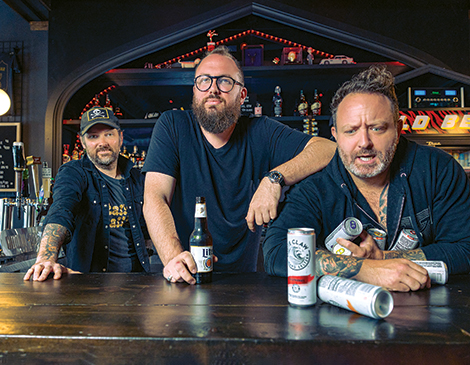
Photo Caption: Sim Ross, Will Hollingsworth and Aaron Sechrist at Old 86. By Heidi Rolf.
But along the way, The Spotted Owl founder has ruffled some feathers.
Hollingsworth's May 2024 announcement that his company would revive the beloved La Cave, the former Coventry Village wine bar, set off a social media firestorm, with embers still burning today. Once revered for his treatment of employees during the pandemic and for his scrappy craft cocktail lounge, the internet mob branded Hollingsworth as a tyrant who treated his employees as disposable means to his ambitious ends.
He hasn’t talked about it much, other than to the mirror and his closest confidants, which include his executive team of Rolf, vice president of operations Kathleen Sullivan and vice president of development Sin-Jin Satayathum. But the event occupies his mind constantly — even in front of La Cave's charcuterie board of imported meats and cheese.
“You want to hear the full story?” says Hollingsworth, who sits forward and begins to bounce his leg. “I’ll tell you.”
II. Home in Cleveland
Born in Southern California, Hollingsworth moved to Oregon when he was young. His parents were high school dropouts who told great stories and better jokes. They always kept books in the house, and eventually, Hollingsworth saw them both earn GEDs and college degrees.
In 2008, Hollingsworth graduated from St. John’s College in Santa Fe, New Mexico, a rigorous and progressive school of just a few hundred students where he studied philosophy and liberal arts. He wrote his senior thesis on Sir Francis Bacon’s 1682 novel The New Atlantis, which depicts the creation of a utopia. He went on to work in politics, first for a liberal think tank and then for Barack Obama's presidential campaign. When he hit a rut in Washington, D.C., he hit the road with a friend who needed a ride to San Francisco.
A roundabout trip down the East Coast, across the country and back to the Midwest ended with his 1991 Nissan Pathfinder sputtering into Cleveland, where a friend promised to bring it back to life. He liked the spirit of the city. So, he decided to stay. With less than $1,000 to his name, he rented “a death trap of an apartment for $400 a month” in Tremont and got by working on motorcycles.
One night, he visited a friend at Greenhouse Tavern, the newest restaurant on East Fourth Street, which would propel chef Jonathon Sawyer to a James Beard Award. The innovative take on American cuisine and the fast-paced atmosphere were intoxicating. He had to work there. Only, someone with next-to-zero hospitality experience doesn’t just decide to work at the best restaurant in town. So, Hollingsworth parsed out his last few dollars to eat and loiter at Greenhouse Tavern until he was hired as a food runner. From there, he graduated to bus boy, dishwasher, daytime bartender (where he mostly served “weird hippie Diet Cokes”) and then, finally, bartender. He loved the gig but got fired after about a year. He landed softly as a bartender at Lolita, the arguably cooler sister restaurant to Michael Symon’s fine dining Lola Bistro on East Fourth Street.
Lolita is also where he met Satayathum and Sullivan. Satayathum had designed Greenhouse Tavern, but most of the time, he was a bartender. Sullivan was a server who had managed a Papa Johns through her teens. Surviving the trenches night after night built comradery. After each battle, partying at the Tremont bars with other hospitality friends nursed their wounds before the war waged on the next day. The atmosphere in both kitchens was exciting but not easy. Chefs screamed and swore. But each kitchen taught him lessons he’d carry through his future projects.
“Sawyer’s talent and charisma was so overwhelming. I learned how electrifying this business could be,” Hollingsworth says. “From the Symon organization, I learned about toughness and competence and systems and organizational infrastructure and middle management and how to do things really, really well.”
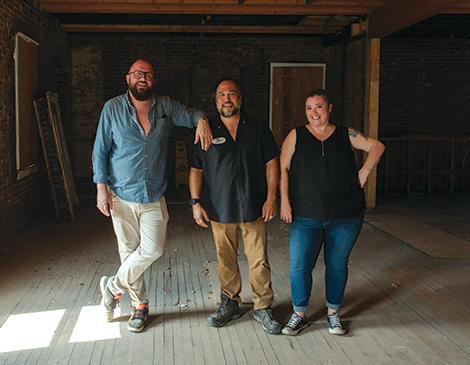
Photo Caption: Buildings & Food's Will Hollingsworth, Sin-Jin Satayathum and Kathleen Sullivan. Photo by Heidi Rolf.
After four years, he was ready to apply that knowledge to his own endeavor. After 11 months of business planning, defaulting on his student loans and raising capital, he leased an abandoned 2,225-square-foot basement on Jefferson Avenue. Accessed through a gate and an overgrown courtyard, the former stable for livestock had dirt floors. Through the dank dust, Hollingsworth and Satayathum envisioned greatness.
“Sin-Jin and I would close down Lolita, and then we’d go to Lava Lounge and close down Lava Lounge,” says Hollingsworth. “Then, we would come down here with flashlights and headlamps, when it was a dirt floor, and be like, ‘This is where the banquette should be. This is where the bar will be.’ We did that for months and months.”
Led by Satayathum, construction took just under a year. In 2014, the duo finally flicked on the lights at The Spotted Owl. Then, Hollingsworth went home to find his own electricity had been turned off.
“I put every penny I had into this business,” he says. “I put it all on black.”
-heidi-rolf-will-hollingsworth-sin-jin-satayathum-and-kathleen-sullivan.-by-daniel-lozada.jpg?sfvrsn=5151f68c_1)
Photo Caption: (Left to Right) Heidi Rolf, Will Hollingsworth, Sin-Jin Satayathum and Kathleen Sullivan. By Daniel Lozada
III. The Spotted Owl
A crowd of regulars followed Hollingsworth to The Spotted Owl. Sullivan joined six months later. Still, initial reviews were mixed. Craft cocktails were still new to Cleveland. Velvet Tango Room opened in 1997 as a place to dress up and sip Manhattans or Negronis. Opened a year before The Owl, Porco Lounge & Tiki Room hung their decorative umbrella on history and Instagrammable decor and products. The Owl focused its attention on detail, quality and storytelling, with themed menus and the Cocktail Wheel Experience, which would help guests pick a drink based on their mood. But the high-low concept, mixologists who also serve High Life, remained a tough sell to the working-class, shot-and-a-beer crowd.
“It sucked to be New York City’s favorite bar in Cleveland,” says Hollingsworth. “That was cold comfort. We were broke as shit.”
The acclaim that would come later was hard-earned. Margins were tight. Hollingsworth and Sullivan, who made the jump to The Owl from Lolita a year after it opened, drove the staff hard. Drinks that didn’t meet the standard got sent back.
“When people talk about the early days, yeah, dude, I wasn’t a big, soft sweetheart,” says Hollingsworth. “Our only path forward was to put out a better product than everybody else, so yeah, I was intense. If you’re dedicated to excellence, it’s not always a slumber party.”
Taurell Bush poured one of the first drinks at The Spotted Owl. It was slower than his previous high-volume bartending gigs at Barrio Tacos and Melt Bar and Grilled, which continued to supplement The Owl's low tips. The stakes were always high. Pressure weighed on the bartenders. Still, Bush calls it a “family environment.”
“I never gave a damn as much as I did when I was there,” he says. “Will allowed me a place to have a stage and hone my craft. I really dove into it there.”
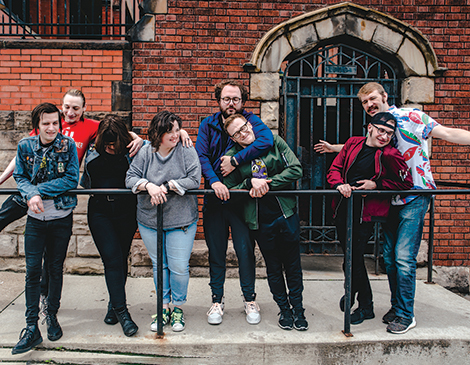
Not everyone remembers their time as fondly. Cleveland Magazine spoke to several former employees who described a culture of mistrust and verbal abuse. One, who requested they be referred to as “former beverage director,” described being a “wide-eyed cocktail enthusiast,” who arrived an eager 21-year-old. Red flags arose as they moved up through the ranks. Hollingsworth looked at employees “pragmatically,” they say, overworking them while they were “extremely underpaid.” They described trends of manipulation, impulsivity and alcohol-fueled rage over two years of working there.
Today, the former beverage director studies restaurant psychology. Inspired by their time at The Spotted Owl, the endeavor is an effort to combat a toxic culture that still exists across the industry.
“That wasn’t the first time I’d experienced something like that in this industry, but it was definitely the most intense,” they say. “I was working, like, 90 hours a week. I had a goal in mind, and I think they saw that and took advantage of it.”
After this story was released, Hollingsworth responded further to these allegations.
"Many people who left the Owl during those years went on to great opportunities in this business, because of their own merit and because of their experience with us. I was sometimes a jerk back then; we were fighting for our lives. Losing money. But everyone was compensated fairly for their time."
Hollingsworth concedes that he was tough on people but stops short of saying any of the behavior crossed a line.
“I’ve made mistakes. I’m not trying to absolve myself of that,” says Hollingsworth. “Was I abusive with people? Absolutely not. Was I some wrathful monster? Absolutely not.”
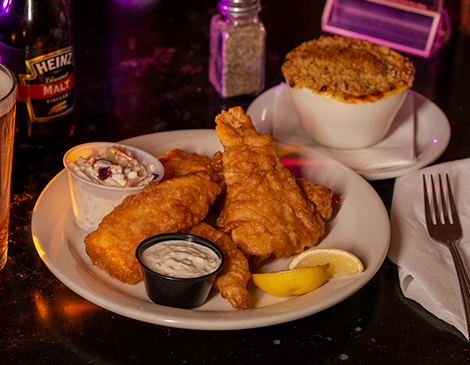
Photo Caption: Prosperity Social Club's fish fry. Courtesy Prosperity Social Club.
IV. Prosperity Social Club
A spirit moved Bonnie Flinner the first time she entered the building that she would five years later turn into Prosperity Social Club.
“I understood that it was a special place with history,” she says. “I’ve always felt the space had a soul of its own.”
The brick structure on Starkweather Avenue doesn’t look much different than it did 85 years ago, when Stanley Dembowski opened as Dempsey’s Oasis. Vintage light-up beer signs hang on wood-panel walls above a checkerboard tile floor. Liquor bottles clutter the shelves behind the wood bar, where the mechanical cash register has been replaced by a touchscreen credit card reader. Pierogies and beer-battered Haddock still swim out of the kitchen, though it’s doubtful that Dempsey’s served the heart of palm vegan alternative.
In 2005, after the previous owners let the building fall into disarray, Flinner jumped at an opportunity to purchase it. She worked to clean up the space without changing things too much. Any added decor needed to look like it’d been there forever.
“This was our dream place,” says Satayathum. “It’s where we all went after work. Bonnie did a great job of figuring out what worked there. I mean, they did fish fries in the ’30s, and she brought it back and made it a staple.”
In 2019, Flinner felt burned out by the restaurant industry and was ready to move on, but passing the torch during a pandemic didn't feel right. One day during a takeout-only fish fry season, Hollingsworth burst in the back door declaring, “I’m going to buy this bar!” (That wasn’t public, but rumors move quickly among hospitality workers, Flinner says.) At first, she passed on some lowball offers, which showed Flinner Hollingsworth's cutthroat side. (Hollingsworth disagrees with this description of events. “I was always respectful to Bonnie,” he says.) In 2021, she agreed to sell.
Over the following months, the new owner made some updates to the 80-year-old building, mostly behind the scenes, such as fixing the HVAC and nudging the bar forward a few feet to create more space for bartenders. But the restaurant remains largely unchanged.
“I don’t want to us to be the kind of people who go see what’s popular in f------ Denver and then build it in Cleveland,” Hollingsworth says. “I want us to be the people who try to protect classic hospitality experiences, like Prosperity.”
When the sale went through, Flinner didn’t know Hollingsworth had ambitions to expand.
“If I would have known his future business growth, we might have had some conversations about what type of management he really needs to have in place,” she says. “I thought he was going to be more hands on, but I can’t fault him for fulfilling his dream and vision. I don’t regret selling it to him. I think he’s a great operator.”
Today, Flinner mostly lives in Bristol, Virginia, where her husband runs a boutique recording studio, The Earnest Tube, which preserves country music history and records direct to lacquer. In the news release Flinner sent out announcing the transition, she said that she’d still be a regular. But more than two years later, she rarely goes back.
“It’s hard,” she says. “There are just so many memories.”
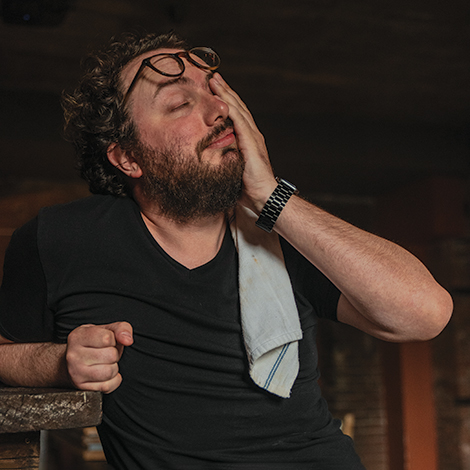
Photo Caption: Will Hollingsworth by Heidi Rolf.
V. The Transition
The Spotted Owl's push for perfection continued through 2021, but Hollingsworth’s heart was no longer in cocktails. A PPP loan helped the company pay its employees through the shutdown (though Hollingsworth says he “borrowed a lot of money,” too). The team tried a patio concept and new menu after new menu, but nothing seemed to revive his spark.
An itch to rework The Spotted Owl wouldn't subside. He pictured a dark room with cool music. Elevated, not stuffy. Definitely focused on wine. Dude, you’re just describing La Cave du Vin, he thought.
For 23 years, La Cave was a ramshackle basement oasis in Cleveland Heights’ Coventry Village, perfect for an intimate first date or a place to just disappear. Erich Lasher served as the bar’s wine and beer expert. When it closed in 2018, he thought he was done. But the prospect of collaborating with Hollingsworth pulled him back in.
“I’m not very social,” he says. “But when I’m here, I’ma butterfly.”
Over six months, Buildings and Food built La Cave du Vin 2.0. Lasher curated the wine list. Sullivan and Hollingworth honed the front-of-house experience. Satayathum designed the red-hued lair. Rolf rolled it all into a stylish marketing campaign. At first, planning took place behind the scenes, but eventually word started getting out. Former employees say the company did not formally present the idea to The Spotted Owl staff, but everyone knew, to some degree, that a transition was coming, whether they were told directly or overheard conversations. Buildings and Food says all employees had already been offered new jobs within the company.
On May 8, Buildings and Foods fired general manager Bryan Tetorakis, who had just returned from five weeks of paid paternity leave. Tetorakis, acclaimed for his work in Los Angeles and Washington, D.C., propelled the bar to its most profitable year ever. The company says Tetorakis had agreed to a deal in a recent review that said he would be rewarded with a raise when Old 86, which he was going to manage when it opened a few days later, started bringing in revenue. During this time, Tetorakis spoke openly — as did bartender Dan Watson — about leaving to start his own cocktail bar. (Tetorakis will soon open Bad Medicine, and Watson opened Never Say Dive last year.) According to Buildings and Food, a week after his review, the new father requested that his raise come quicker than previously agreed upon. If it didn’t, he wouldn’t help with Old 86, "an unreasonable ultimatum," the company says. After a discussion with Hollingsworth, the company parted ways with Tetorakis. “He wasn’t being honest with us,” Hollingsworth says.
The Buildings and Food team told the staff that the transition to La Cave would be announced to the public sooner than expected. The Spotted Owl would be sent off over the next few months with one last menu called Education of Cyrus, an ode to an early fan-favorite menu. As previously discussed, employees could take severance or find new jobs within the growing company. The night before the announcement, an employee called Sullivan to tell her that most of the staff planned to walk out in solidarity with Tetorakis.
That weekend, Sullivan had to bury her dog and grandfather. Hollingsworth was a groomsman in a wedding. With no one to work the bar, The Spotted Owl closed without a hoot.
The announcement the next day looked intentional but hasty. Rumors spread quickly. A flippant remark from Hollingsworth in a Cleveland Scene story — a dig at an art form that practitioners see as no less valid than painting — angered the cocktail community.
“The Spotted Owl just wrapped up its best-ever year, both in revenue and profit,” Hollingsworth said in a news release. “But I’m bored. I’m bored with cocktails right now — but I won’t be forever. I love bars. I never get bored of bars, especially my bars. I love The Owl, I love what we’ve accomplished there, and I am proud of every bartender, barback, server, cocktail and mug of beer. But we’ve gotten to a place, as a company, where we can change things when we get bored. One of Buildings and Food’s values is that we never play defense. We’re not beholden to revenue, or to profits — we want to be engaged in our work, we want to do new things, we want to take risks. That’s what The Owl has always been, because that’s who we are. We’re bored with cocktails, and we want to sell wine. We want to talk about wine, we want to get people excited about wine. And La Cave was always the coolest place in Cleveland to drink wine.”
A narrative of workers enduring hardship to solve an owner's boredom isn't often well-received. Within hours, hundreds of comments on Instagram and Reddit determined that Hollingsworth was a villain:
The employees found out via the Instagram post that The Owl was closing and being changed to a wine bar.
No notice, just booted the whole staff.
They found out on Thursday, ahead of the weekend, where they make all their money.
I’m boycotting harder than I boycott Townhall.
Will is a known practitioner of violating any good faith with his staff.
F--- Hollingsworth and f--- his company, Buildings and Food.
“At my grandfathers funeral, people were coming up to me asking what happened with The Spotted Owl,” says Sullivan. “Nobody was oblivious to the fact that we were going to close.”
A May 2023 party called “Angry Birds” thrown by Lakewood cocktail bar LBM solidified the narrative. Designed to raise money for the now-jobless bartenders, LBM promoted the party using The Spotted Owl's logo and a tagline reading: “a boring cocktail pop-up.” (LBM declined to comment.) More than 600 drinks were poured. The bar sold out with a line stretched around the block. Restaurants such as Cordelia, Soho Chicken & Whiskey, Thyme Table and Salt donated food. Many of the restaurants, attendees and commenters were — and some still are — friends of the Buildings and Food staff.
“All of the people who brought food to the party that LBM threw without doing any due diligence legitimized it and supported this fairy tale,” says Hollingsworth. “No one called us to ask what
actually happened. That wound is still very fresh. I still feel very alone.”
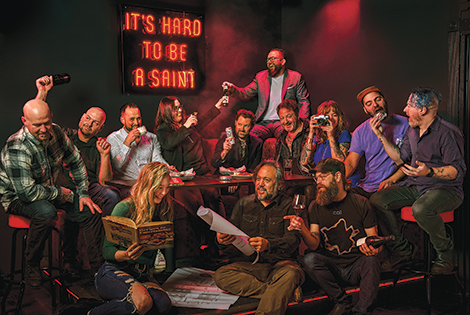
Photo Caption: The Buildings & Food team at Old 86. By BurkleHagen Studio. Courtesy Buildings & Food.
VI. Moving Forward
Six months after our first meeting, the waitress at Sichuan Hot Pot sees Hollingsworth and asks, “Do you need a bigger table?” “No,” he says, placing an order of string beans, fried rice, hot and spicy crispy fish and sliced beef with hot pepper. “She knows I order a lot of food,” he says with a smirk.
Hollingsworth seems different than the first time we met. Timid and reserved, he’s replaced his black shirt with a navy blue one. For months after the La Cave du Vin announcement, the Buildings and Food executive team went on a social media blackout. While Rolf is back to posting silly quotes and karaoke selfies, she “had a total mental breakdown” that she is still recovering from, she says, and was only able to return after the company granted her a paid leave of absence.
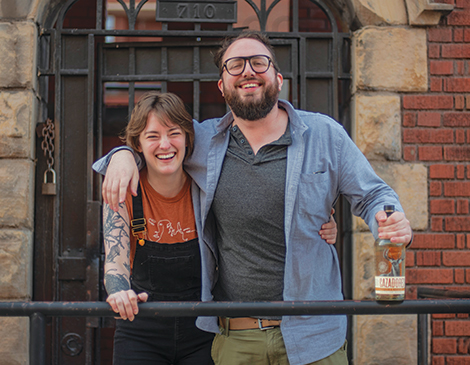
Photo Caption: Heidi Rolf and Will Hollingsworth (left to right). Courtesy Heidi Rolf.
Hollingsworth, who once said “if you hurt my people, I’ll come after you,” now tells me he’s been looking inward and “doing the work.” After his rapid ascent, he’s finally slowing down, reflecting on what’s happened and confronting “the bad feelings that I have worked hard to avoid my entire life.”
He doesn’t want to fight like he has over the past year and change. Even the company’s most recent acquisition — the former Griffin Bar and Cider, another announcement that was met with vitriol — was more than just expanding into Lakewood. The building on Madison Avenue is directly next door to LBM — a real-life version of what the HBO show Curb Your Enthusiasm calls a “spite store.” Any doubts of that were put to rest by a sarcastic news release that read: “My whole team and I are excited to be next-door neighbors to our dear friends and colleagues at LBM, who have always treated us with so much kindness and generosity of spirit.”
“I can’t be somebody who goes to war every time he gets f----- over,” he says. “I have become aware of this black thing in me, and I have to work to get rid of it.”
Revenge isn’t driving Hollingsworth anymore. He also isn’t looking for vindication, he says. He’s simply trying to move forward. He wants to “continue to build cool shit.” But most important, he’s dedicated to keeping Buildings and Food alive for his more than 100 employees, for whom he’s paid for everything from root canals to further education, and, especially, Sullivan and Satayathum, who have been constants in his life. Last year, when they got married in Ireland, Hollingsworth served as the officiant.
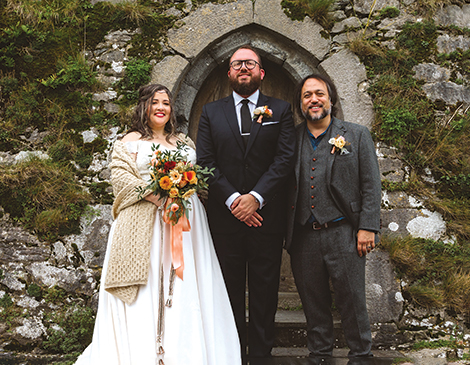
Photo Caption: Will Hollingsworth serving as the officiant at Kathleen Sullivan and Sin-Jin Satayathum's wedding. Courtesy Twin Flames Elopements Ireland.
“He has gone out of his way to help people,” says Sullivan. “In any situation, it doesn't matter. You get a DUI, and you work for Will, and you call Will. He will make sure that he writes those letters and make sure that he does anything he can to help you find and pay for a good lawyer. The amount of things he does for people often goes unnoticed because he is such a big personality.”
So if he doesn’t crave revenge or vindication and, more and more, ambition seems like a crutch, what drives him to keep on building?
“Ultimately, my gig is to make sure this f------ thing continues to work,” Hollingsworth says. “I’m being very genuine when I say this: When I get run out of town, I’ll go somewhere else and do it again. I’ll be fine. Heidi has an incredibly marketable skill set. So does Sin-Jin. So does Sully. They’ll be fine, too. But it won’t be as cool as what we’re doing right now.”
Corrections: A previous version of this story incorrectly stated that Aaron Sechrist ran Old 86. He is a collaborator. It stated that The Spotted Owl was purchased by Will Hollingsworth. The Spotted Owl space was leased. Finally, the pinball machine in Prosperity Social Club was removed prior to Buildings and Foods taking ownership. A line referencing it has been removed.
For more updates about Cleveland, sign up for our Cleveland Magazine Daily newsletter, delivered to your inbox six times a week.
Cleveland Magazine is also available in print, publishing 12 times a year with immersive features, helpful guides and beautiful photography and design.

Dillon Stewart
Dillon Stewart is the editor of Cleveland Magazine. He studied web and magazine writing at Ohio University's E.W. Scripps School of Journalism and got his start as a Cleveland Magazine intern. His mission is to bring the storytelling, voice, beauty and quality of legacy print magazines into the digital age. He's always hungry for a great story about life in Northeast Ohio and beyond.
Trending
-
1
-
2
-
3
-
4
-
5










